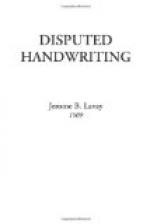In case of the arrest of one of the “presenters” in the act of “laying down” forged paper, the middleman or shadow immediately notifies other members of the band who may be in the city. All attempts to get money from the other banks are stopped, and the other members of the band leave the city as best they can to meet at some designated point in a near-by city. Out of their first successful forgeries a certain sum from each man’s share is held by the “middleman” to be used in the defense of any member of the band who may be arrested on the trip. This money is called “fall money,” and is used to employ counsel for the men under arrest, or to do anything for them that may be for their interest. Any part of this money not used is paid back in proportion to the amount advanced to the various members of the band from whose share it has been retained. Sometimes, however, in forming a band of forgers there is an understanding or agreement entered into at the outset that each man “stand on his own bottom”—that is, if arrested, take care of himself. When this is agreed to, the men arrested must get out as best they can. Under these circumstances there is no assessment for “fall money,” but usually the men who present the paper insist on “fall money” being put up, as it assures them the aid of some one of the band working earnestly in their behalf and watching their interests, outside of the attorney retained.
When one of the party is arrested, an attorney is at once sent to him. As a rule, in selecting an attorney, one is employed who is known as a good criminal lawyer. It is also preferred that he should be a lawyer who has some political weight. The middleman employs the attorney, and pays him out of the “fall money.” The arrested man is strictly instructed by the attorney to do no talking, and is usually encouraged by the promise that they will have him out in a short time. In order to keep him quiet, this promise is frequently renewed by the attorney acting for the “middleman.” This is done to prevent a confession being made in case the arrested man should show signs of weakening. Finally, when he is forced to stand trial, if the case is one certain of conviction, the attorney will get him to plead guilty, with the promise of a short sentence, and will then bargain to this end with the court or prosecutor. Thus guided by the attorney selected and acting for the “middleman” and his associates, the prisoner pleads guilty, and frequently discovers, when it is too late, that he has been tricked into keeping his mouth shut in the interests of his associates. It is but fair to state, however, that if money can save an arrested party, and if his associates have it, they will use it freely among attorneys or “jury fixers,” where the latter can be made use of, and frequently it is paid to politicians who make a pretense of having a “pull” with the prosecuting officers of the court.
In most instances when checks are sent out they are not seen again by the maker for a period of days. As business houses of any considerable magnitude always have a comfortable balance with their bankers, ample time and an abundance of cash are thus placed at the disposal of the check-raisers.




